Looking for luxury hotels in notable places. In Hong Kong, the superlatives are accurate.
By Donna Peck
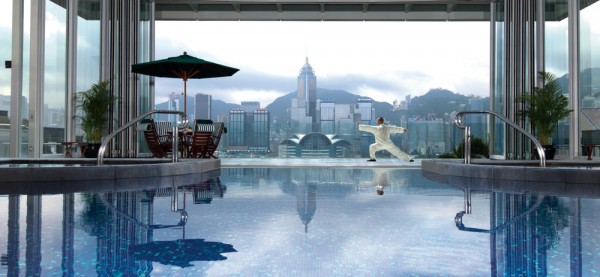
For travelers of modest means, staying in a five-star hotel is a precipitous drop from reality.
Sometimes that’s exactly what’s need. The hotel’s chauffeur guides you seamlessly through customs and immigration out to a waiting Mercedes limousine. You never have to touch your bags.
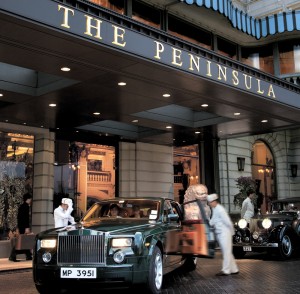
The doorman greets you by name, “How lovely to see you.” “How was your journey?” Welcoming you with gestures of genuine pleasure. He’s a total stranger, no matter, he’s happy to see you. And you are happy to here. He ushers you into an opulent interior of marble, chandeliers, tinkling fountains. A sheen on every surface.
Butlers, housekeepers and round-the-clock staff ensure that for the next 24 hours life is perfect.
Wouldn’t this be what you would prescribe for a dear friend who’s been through a lot lately? My own need for five-star therapy brought me to Hong Kong whose hotels are nominated the best in the world.
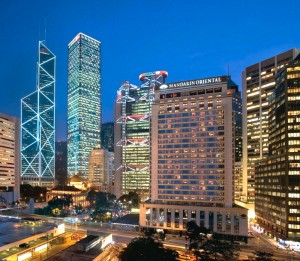
Staying at the Mandarin Oriental on Hong Kong Island, Jan Morris wrote, “The moment its elderly Rolls drops you at its front door you know you have struck quality.” Hotels like the Mandarin Oriental, the Peninsula, Island Shangri-la have honed their services over a long history of housing the extremely wealthy.
Hotel fantasy
It was Saturday in my hotel suite at the Island Shangri-la Hotel in Central. I checked into a borrowed fantasy, a limited-time fantasy, a try-it-on-for-size fantasy. My room faces Victoria Harbour, a mesmerizing view any time of the day.
The concierge secured reservations at the China Club—the private members club atop the art deco Bank of China building. The jazz band, rooftop terrace and Chinese art collection cosset diners in the trappings of colonial Hong Kong. I return to my fantasy home, the doorman welcomes me back. We’re now friends, acquaintances.
Dim Sum Hong-Kong style
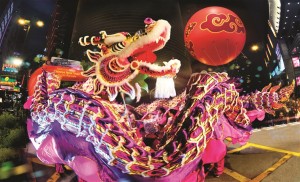
I also chose Hong Kong to take in the heady sights, sounds and tastes of Chinese New Year. Lunches were devoted to dim sum, translated from Cantonese as “small treats that touch the heart.” Following the concierge’s advice, I arrive at Yung Kee on Wellington Street at 11 a.m. before the throng descends. To arrive earlier, you risk missing the best fare, he said, because “the kitchen holds back certain dishes until their dining rooms are full.” Dim sum tastes best eaten moments after taken from the steamer.
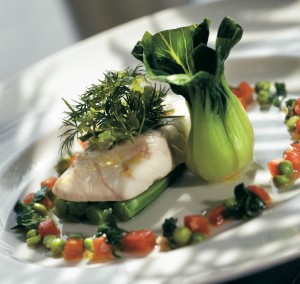
The room was noisy, frenetic and tantalizing. Waiters pushed carts between tables, dispensing steamer baskets and dishes of dumplings, buns and custards, barking their names in Cantonese: har gau, shrimp dumplings; sui mai, open-faced pork dumplings wrapped in steamed won-ton skins, sze jup pai gwat, steamed spareribs in black bean sauce.
Other tips from the concierge I appreciated, “Order gok fa cha, chrysanthemum tea, sip it between courses to cleanse your palate.” And “overturn the teapot lid to signal to the waiter you want a refill.”
French champagne and fireworks
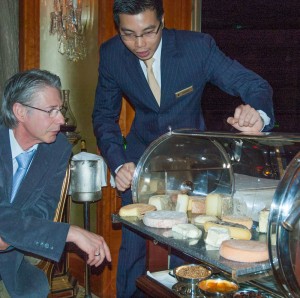
Another evening, my query for the city’s best French chef led me to the Island Shangri-la’s 56th floor where Frederic Chabbert showed his artistry with a vegetables and herbs salad decoratively sliced to make an edible garden basket.
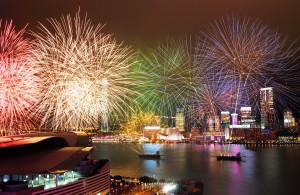
At 8 p.m. a laster-light show flashed outside the window. Multi-colored laser lights synchronized to music swept across the skyscrapers’ glass-and-steel surfaces. I was momentarily lit up in the laser light as it swung past, a direct hit.
Because of Chinese New Year, pyrotechnics were added to the show, so the sky over Victoria Harbour burst into bloom; fireworks shaped like chrysanthemums in yellow, orange, crimson and silvery white.
The romance and euphoria lingered. I was sipping Krug Grande Cuvée but didn’t need bubbles to feel intoxicated. The cityscape at midnight was entrancing. A light artist illuminated floors on several buildings using the buildings as a canvas.
As a last hurrah, the concierge made arrangements for me to dine in the visitors box at the Happy Valley racecourse. British colonialists wanted to bring horse racing to the Far East, so they drained a swamp and built a track on the island’s only flat land. The track’s view has diminished—encircled by a towering skyline —but not the popularity of horse racing.
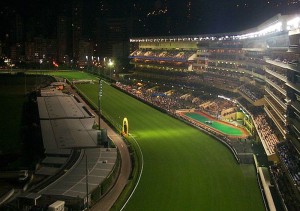
The biggest draw is the Chinese New Year race, which features a lion dance and a meet-and-greet with jockeys who give out good luck envelopes containing money.
Wishes for good fortune, prosperity in the new year rained down upon me as I checked out.
You may think that five-star luxuries induce a dangerous state of euphoria that could become habit-forming. Not so. But I let the euphoria linger. The change was refreshing and life-affirming.
Photography courtesy of Hong Kong Tourism.
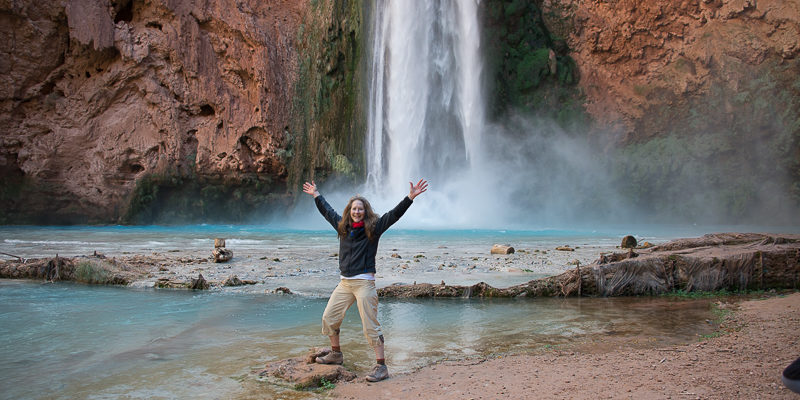
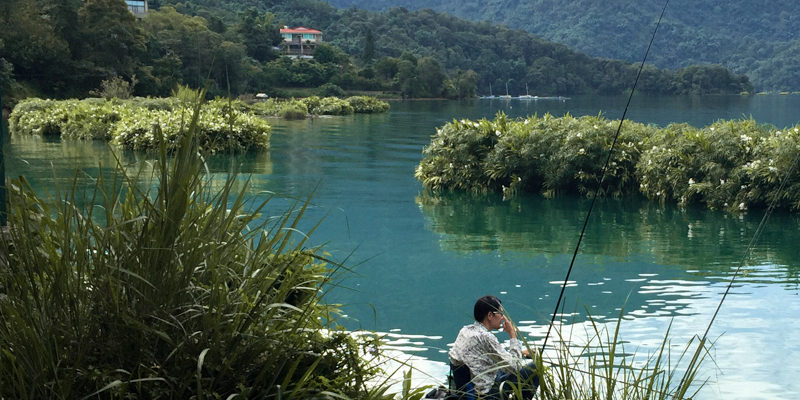
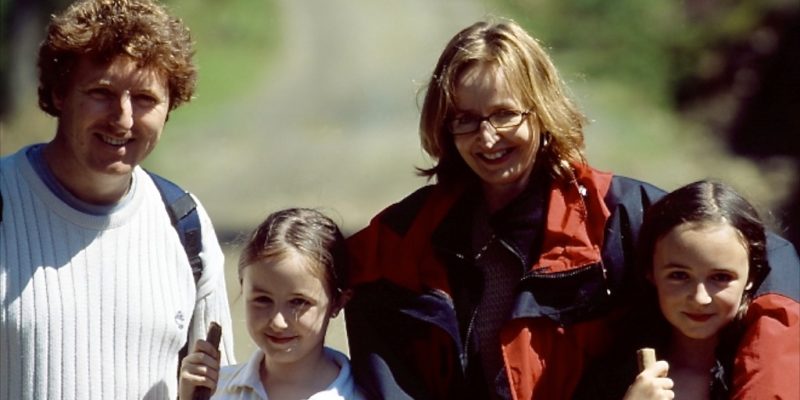
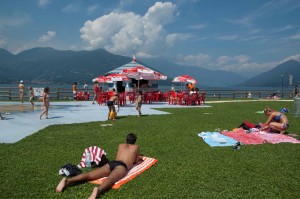
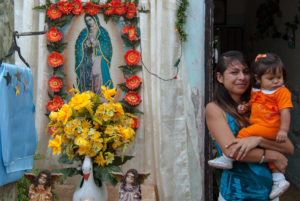

Leave a Reply